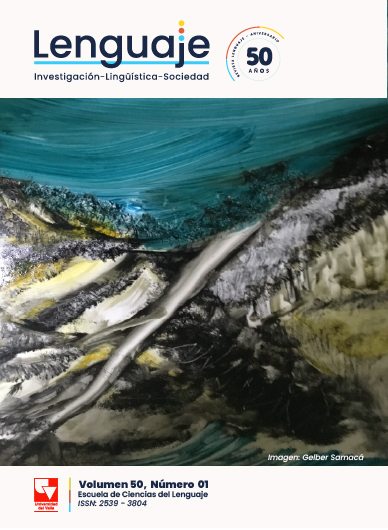Fomentando el involucramiento en el aprendizaje de lenguas a través de prácticas de alfabetización critica
Palabras clave:
alfabetización crítica, aprendizaje de idiomas, involucramiento en el aprendizaje de lenguas, problemáticas socialesContenido principal del artículo
El estudio descrito en este artículo intenta determinar la relación existente entre el involucramiento en el aprendizaje de idiomas y la alfabetización crítica de 34 estudiantes de noveno grado de una escuela pública de Caquetá, Colombia. Se realizó una investigación acción participativa y se usaron los siguientes instrumentos de recolección de información: entrevistas grupales, cuestionarios y artefactos escolares. Las experiencias de los estudiantes en relación con temas sociales informaron la práctica de alfabetización crítica para proporcionar a los aprendices las herramientas necesarias para enfrentar los problemas que ocurren en su comunidad. Los resultados de esta investigación sugieren que la práctica de una alfabetización crítica compromete a los estudiantes en el proceso de aprendizaje desde unas dimensiones cognitivas, sociales y emocionales. Este enfoque crítico juega un papel crucial en activar la disposición de los estudiantes para enfrentar el aprendizaje de un idioma y contrarrestar las emergentes dificultades para aprender.
Ahn, S.-Y. (2016). Exploring language awareness through students' engagement in language play. Language Awareness, 25(1-2), 40-54. https://doi.org/10.1080/09658416.2015.1122020.
Al Rifai, N. (2010). Attitude, motivation, and difficulties involved in learning the English language and factors that affect motivation in learning it. Procedia-Social and Behavioral Sciences, 2(2), 5216-5227. https://doi.org/10.1016/j.sbspro.2010.03.849.
Appleton, J.J., Christenson, S.L., Kim, D., & Reschly, A.L. (2006). Measuring cognitive and psychological engagement: Validation of the Student Engagement Instrument. Journal of School Psychology, 44(5), 427-445. https://doi.org/10.1016/j.jsp.2006.04.002.
Bacon, C.K. (2017) Multilanguage, Multipurpose: A Literature Review, Synthesis, and Framework for Critical Literacies in English Language Teaching. Journal of Literacy Research, 49(3), 424-453. https://doi.org/10.1177/1086296X17718324.
Barno, R. (2014). Critical Literacy for Transformation (Doctoral dissertation). Binghamton University, New York, United States of America.
Betts, J. (2012). Issues and Methods in the Measurement of Student Engagement: Advancing the Construct Through Statistical Modeling. In S.L. Christenson, A.L. Reschly & C. Wylie (Eds.), Handbook of Research on Student Engagement (pp. 783-803). https://doi.org/10.1007/978-1-4614-2018-7_38.
Cañas, C., & Ocampo, A.P. (October 18, 2013). Creating New Literacy Approaches in Our Classroom. ML2 – Second Language Literacies [Online]. https://ml2secondlanguageliteracies.wordpress.com/2013/10/18/creating-new-literacy-approaches-in-our-classroom/.
Comber, B. (2017). Literacy Geography and Pedagogy: Imagining Translocal Research Alliances for Educational Justice. Literacy Research: Theory, Method, and Practice, 66, 53-72. https://doi.org/10.1177/2381336917717479.
Contreras, J., & Chapetón, C. (2017). Transmorfing EFL Classroom and Promoting Students’ Empowerment: Collaborative Learning From a Dialogical Approach. PROFILE: Issues in Teachers’ Professional Development 19(2), 135-149. https://doi.org/10.15446/profile.v19n2.57811.
Creswell, J.W. (2014). Research Design: Qualitative, Quantitative and Mixed Methods Approaches (4th ed.). Sage.
Cruz, A. (2018). The Wisdom of Teachers’ Personal Theories: Creative ELT Practices From Colombian Rural Schools. PROFILE: Issues in Teachers’ Professional Development, 20(2), 65-78. https://doi.org/10.15446/profile.v20n2.67142.
Finlay, K.A. (2006). Quantifying School Engagement: Research Report [Online]. https://schoolengagement.org/wp-content/uploads/2021/02/QuantifyingSchoolEngagementResearchReport.pdf.
Fredricks, J.A., Blumenfeld, P.C., & Paris, A.H. (2004). School Engagement: Potential of the Concept, State of the Evidence. Review of Educational Research, 74(1), 59-109. https://doi.org/10.3102/00346543074001059.
Freire, P., & Macedo, D. (1987). Literacy: Reading the word & the world. Routledge.
Gillis, A., & Jackson, W. (2002). Research for Nurses: Methods and Interpretation. F.A. Davis Company.
Institución Educativa Juan Bautista la Salle. (2009). Proyecto Educativo Institucional [PEI].
Jordão, C., & Fogaça, F.C. (2012). Critical literacy in the English language classroom. DELTA: Documentação de Estudos em Lingüística Teórica e Aplicada, 28(1), 69-84. https://doi.org/10.1590/S0102-44502012000100004.
Kaminski, A. (2019). Young learners’ engagement with multimodal texts. ELT Journal, 73(2), 175-185. https://doi.org/10.1093/elt/ccy060.
Kemmis, S., & McTaggart, R. (2005). Participatory Action Research: Communicative Action and the Public Sphere. In N.K. Denzin & Y.S. Lincoln (Eds.), The Sage Handbook of Qualitative Research (3rd ed.) (pp. 559-603). SAGE Publications.
Kumaravadivelu, B. (2001). Toward a postmethod pedagogy. TESOL quarterly, 35(4), 537-560. http://www.bkumaravadivelu.com/articles%20in%20pdfs/2001%20Kumaravadivelu%20Postmethod%20Pedagogy.pdf.
Lally, C. (2002). Discrepancies in Teacher and Student Perceptions of French Language Performance. The French Review, 75(5), 926-941. https://www.jstor.org/stable/3133436.
Lankshear, C., & Knobel, M. (2009). More than words: Chris Searle’s approach to critical literacy as cultural action. Race & Class, 51(2), 59-78. https://doi.org/10.1177%2F0306396809345577.
Lewison, M., Flint, A., & Van Sluys, K. (2002). Taking on critical literacy: The journey of newcomers and novices. Language arts, 79(5), 382-392. https://www.jstor.org/stable/41483258.
Lewison, M., Leland, C., & Harste, J. (2007). Creating critical classrooms: K-8 Reading and Writing with an Edge. https://doi.org/10.4324/9780203826317.
Marks, H.M. (2000). Student Engagement in Instructional Activity: Patterns in the Elementary, Middle, and High School Years. American Educational Research Journal, 37(1), 153-184. https://doi.org/10.3102/00028312037001153.
Marshall, C., & Rossman, G.B. (2006). Designing Qualitative Research (4th ed.). Sage.
Mason, J. (2006). Mixing methods in a qualitatively driven way. Qualitative Research, 6(1), 9-25. https://doi.org/10.1177/1468794106058866.
Mathers, N., Fox, N., & Hunn, A. (2007). Surveys and Questionnaires. https://www.rds-yh.nihr.ac.uk/wp-content/uploads/2013/05/12_Surveys_and_Questionnaires_Revision_2009.pdf.
Miskovic, M., & Hoop, K. (2006). Action Research Meets Critical Pedagogy: Theory, Practice, and Reflection. Qualitative Inquiry, 12(2), 269-291. https://doi.org/10.1177/1077800405284367.
Norris, K., Lucas, L., & Prudhoe, C. (2012). Examining Critical Literacy: Preparing Preservice Teachers to Use Critical Literacy in the Early Childhood Classroom. Multicultural Education, 19(2), 59-62.
Philp, J., & Duchesne, S. (2016). Exploring Engagement in Tasks in the Language Classroom. Annual Review of Applied Linguistics, 36, 50-72. https://doi.org/10.1017/S0267190515000094.
Pineda, C., Bermúdez, J. Rubiano, Á., Pava, N., Suárez, R., & Cruz, F. (2014). Student engagement and academic performance in the Colombian university context. RELIEVE, 20(2), 1-19. https://doi.org/10.7203/relieve.20.2.4238.
Reschly, A.L., & Christenson, S.L. (2012). Jingle, Jangle, and Conceptual Haziness: Evolution and Future Directions of the Engagement Construct. In S.L. Christenson, A.L. Reschly & C. Wylie (Eds.), Handbook of Research on Student Engagement (pp. 3-19). http://dx.doi.org/10.1007/978-1-4614-2018-7_1.
Roca, J., & Murphy, L. (2001). Some Steps Towards a Socio-Cognitive Interpretation of Second Language Composition Processes. International Journal of English Studies, 1(2), 25-45. https://revistas.um.es/ijes/article/view/48351.
Skinner, E.A., & Pitzer, J.R. (2012). Developmental Dynamics of Student Engagement, Coping, and Everyday Resilience. In S.L. Christenson, A.L. Reschly & C. Wylie (Eds.), Handbook of Research on Student Engagement (pp. 21-44). https://doi.org/10.1007/978-1-4614-2018-7_2.
Storch, N. (2008). Metatalk in a Pair Work Activity: Level of Engagement and Implications for Language Development. Language Awareness, 17(2), 95-114. https://doi.org/10.1080/09658410802146644.
Svalberg, A. (2009). Engagement with language: Interrogating a construct. Language Awareness, 18(3-4), 242-258. https://doi.org/10.1080/09658410903197264.
Downloads

Esta obra está bajo una licencia internacional Creative Commons Atribución-NoComercial-SinDerivadas 4.0.

